One week ago, I was on stage hosting the 2020 BSM Summit. New York City was an excellent location for this year’s show, and I couldn’t be more pleased with the results of this year’s show. Pulling off an event like this requires a lot of help. Without great partners, speakers, and attendees, none of it works. To each of you who gave your time or offered company support, I sincerely appreciate it. It makes the nine month process worthwhile.
I’m a firm believer that we should never stop seeking new ways to learn, and that our industry needs to rally together more rather than try to tear each other down. Each year projections for the radio industry fluctuate between flat and down, and if we expect to turn the tide, then we’ve got to find new ways to innovate and educate, and strengthen relationships. If you attend the show and don’t leave the room with actionable items to improve yourself, your staff, and your brand, then I’d question how much attention you paid at the conference. There’s progress and money to be made by attending the Summit, and it’s good to see many who hold it in high regard.
That said, each year when the show ends, I try to get as far away from it as possible. It’s a mentally exhausting process which involves scouting locations, selling sponsorships, creating sessions, securing speakers, laying out details for each member of the BSM team, and designing programs, signage and on stage presentations. There’s also the work after the event such as video editing, photo gathering, sending thank you cards, and gathering feedback on what attendees valued most.
Having had a chance to clear my head and reflect on what stood out, I wanted to pass along a few of my takeaways. I’m sure there’s more I’m forgetting, but these particular points stuck with me.

‘MAYBE YOU DON’T REACH A YOUNGER AUDIENCE’
Bruce Gilbert made the point about radio chasing younger fans who may not be possible to reach over the airwaves during our ‘Power Panel’, and Mike Francesa added to that conversation when he explained why radio is making a big mistake by ignoring older listeners. It got me to thinking about the advertising and ratings world. We’ve measured sports radio’s success for decades based on Men 25-54, but who says that has to continue to be the case?
Mike’s points about people living older, and folks between the ages of 55-64 spending more money on sponsor’s products were fair. It’s also tougher to lure a younger audience to the radio because they consume content much differently. If the main goal of advertisers is to generate ROI (return on investment), and sports radio has the ability to motivate high income earners to support those businesses, then why do we care if the listener is 22 or 62? Shouldn’t the point be to reach people who spend money? Why is a 60 years old listener considered less valuable than a 25 year old male?
Furthermore, who says sports radio is only attractive now to men? Are we going to continue to pretend that women don’t enjoy this type of content too? This notion that sports radio’s success should be based on what mattered 20-30 years ago to Men 25-54 seems antiquated. If the proof shows that older fans watch and listen to games and sports talk more than younger fans do, and the interest in sports talk is growing among women, then maybe it’s time to expect our stations to reach ALL audiences, not just one smaller targeted demographic.
Nobody thinks sports television isn’t big business, yet when it comes to radio, the sports format gets treated like the little engine that could. That needs to stop. There’s no format in radio built for the present and future better than sports talk. Spike Eskin also made a great point about total reach needing to be where we direct our focus moving forward in determining the overall impact and importance of a talent and programmer.
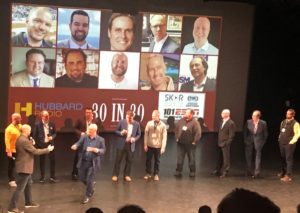
’30 IDEAS IN 30 MINUTES’
One of the coolest things we did at the show was putting 10 PD’s/GM’s on stage to showcase 30 unique ideas in 30 minutes. Too often people go to conferences to network and tune out the information passed along, but if you were in the room for this session, chances are you were on your laptop or phone taking notes or capturing screenshots. The fact that each PD delivered their presentation on time (or very close to it) was a shocker.
Watching this session from the side of the stage reminded me how critical great ideas are. Judging from what each presenter brought to the stage, there’s a lot of cool stuff happening in markets across the country. Now the challenge is taking these big ideas back to our sales teams, and getting them to feel the same enthusiasm when pitching opportunities to existing and potential clients. There’s certainly no shortage of big thinking.
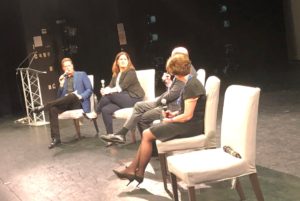
‘FOLLOWING UP AND HELPING SALES IS A MUST’
I’m always fascinated when we do an advertising panel because there’s always something said that resonates. In Chicago in 2018, one of the city’s top advertisers shared that she had never met a program director until our Summit. Last year, Ad Results mentioned that they cared less about Nielsen ratings and more about ideas and podcasting. This year we heard from a key sports radio advertiser that the follow thru from sales isn’t as crisp as it should be. The client was also not familiar with the PD’s of two big stations they do business with.
First, any business spending money on your station’s airwaves deserves five star treatment. That means following up, offering to update copy, checking in to see how the client is feeling about the campaign, and offering added value when opportunities arise. Are you in business with a partner or a sponsor? If it’s the latter, don’t be surprised when they don’t renew.
Secondly, sales professionals should be involving the PD much more in the buying process. If a PD gets in front of the client, and has the ability to hear the client’s ideas and objectives, and share how the station works and what stands the best chance of delivering results, both sides are more likely to have a positive experience.
By nature, most programmers are creative and have an ability to get the talent’s support when executing things to benefit station partners. If you’re in sales and not getting the programmer in front of the client to help you make them feel special, you’re setting yourself up to fail. Don’t get caught up worrying about what the PD might say or who’s idea got used on the air, focus on satisfying the client, following up with them, and delivering what they want most – results!

‘BARSTOOL IS PLAYING CHESS, RADIO IS PLAYING CHECKERS’
I was personally excited to spend time chatting with Barstool Sports CEO Erika Nardini. I find her to be refreshingly candid, one of the brightest and most forward thinking executives in the entire sports media business, and given the success of the Barstool brand, we should all be listening anytime she’s willing to share her wisdom. As I expected, she was tremendous.
There were many great points raised by Erika during our 35 minutes together that were valuable, but a few specific items stuck with me. First, she mentioned how the company understands pace when turning around merchandise. This is an area that Barstool thrives on and radio is asleep at the wheel on. The company has generated roughly a third of its revenue from moving products by recognizing when something is catching on, and reacting swiftly. They also understand that some things will fail, and don’t allow it to discourage them from creating new items. She explained that consumers won’t wait for things today, and compared it to SportsCenter previously being the place to turn to for reaction to the night’s games, whereas now, commentary is available as soon as a key moment occurs on the field or court.
I also appreciated Erika’s insights on podcasting and subscription models. She believes in the value of the live read, and not cluttering digital audio shows with programmatic ads. Erika also said she isn’t as high on the subscription business and feels it’s a lot to ask a brand’s fans to pay for content in addition to buying merchandise, supporting advertisers, purchasing a Rough N Rowdy pay per view, etc..
Lastly, she came across as someone who values radio and believes in fighting for talent. Erika shared that if she oversaw a radio company she’d build more community around talent, taking advantage of meetups, merchandising, and campaigns. She also spoke about the importance of having the back of key talent and not buckling to pressure when outside forces try to harm your business. She expressed how important it is at Barstool to stand for something, and not allow others to push the company around, which in turn has made working with talent like Dave Portnoy and Kirk Minihane valuable to their business.
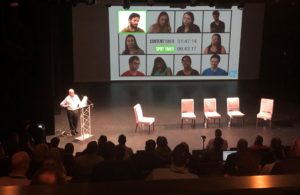
RESEARCH, SOCIAL & PROGRAMMERS ARE CRITICAL
Between Larry Rosin, Fred Jacobs, and Steven Goldstein, we had a lot of smart people on stage offer insights into audience behavior. Each had different areas of focus that resonated with the room, but I particularly enjoyed seeing the amount of people in the room write notes and react as Larry showed video of a focus group weighing in on the insane length of commercial breaks. The on screen example definitely struck a chord.
I also loved Steve Cohen’s passion when I asked why a PD is still necessary in 5 years. We’ve seen a growing trend in the industry where GM’s are now also serving as sales manager for clusters. Companies have tasked some PD’s with managing brands in two cities simultaneously or overseeing 2-4 stations in one building, all with different needs, personalities, and content. Steve emphatically pointed out that people can’t get better and generate results if they don’t have support, training, and someone to work with them. Chris Oliviero followed up by comparing the PD to the conductor of an orchestra. The music may play without them, but without organization and direction, it’s just a matter of time until things don’t function properly.
My one regret is that our Social Studies session went on last on Thursday. I should’ve put it on Wednesday’s schedule. There were a number of PD’s and executives who weren’t in the room for it but needed to be. Demetri and I shared the results of a survey we conducted with 405 industry professionals on how they view their brand’s social media performance. We then did a deeper dive into two stations, showing how ineffective they were in the social space.
I’ve studied social media heavily for the past few years, and I see a few brands operating well, but most are either using a corporately mandated cookie cutter strategy which may work on music brands, but is less effective with a sports radio crowd. Others don’t even have a social strategy. The growth potential in social media is massive, and if sports radio wants to drive listening and advertising, then we’ve got to be much better at it. When your brand is ready to get serious about it, call me.
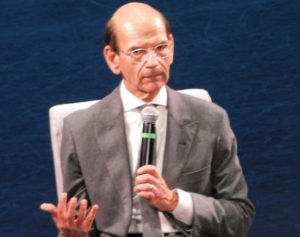
HONEST ADVICE FROM A TOP TALENT
The session I hosted with Bomani Jones, Peter Rosenberg, Brandon Tierney and Paul Finebaum was tremendous. It offered an honest point of view from key talent on how they view the world of sports radio. With other mediums available, many paying higher rates for top talent, why do personalities still feel radio matters?
There were a ton of great takeaways in this session, but two specific things that Paul Finebaum said stayed with me afterwards. When I asked Paul what he’d tell a young person who’s thinking about going into the radio business, he said he’d advise them not to. Paul shared how the industry is crowded, doesn’t pay people well enough, and doesn’t support the talent with making sure important support staff are treated well enough to be able to focus on their job. It was a commentary that sparked a few followups and became a topic of conversation with programmers and others in the room.
The other part of the discussion which connected with me was when Paul talked about the value of an agent and why professionals should look into representation when they’re ready. Paul explained how he’d reached a limit when using a local attorney to do local deals, and though some companies may not like dealing with them, agents work on behalf of the talent to help them earn better treatment. That isn’t always an option when representing yourself and trying to handle your own business.
With podcasting paying premium dollars to top talent to do less work, and TV rewarding personalities who have an ability to pop thru the screen, radio needs to do its part to hold on to exceptional talent. There’s a belief among many that I speak with that radio companies will do all they can to not pay their best people higher salaries. If they do agree to pay more, it usually comes with requesting 5-6 outlandish things that most personalities won’t agree to. Skilled performers will always command attention and bigger dollars, so if radio groups want to hold on to their stars, they’re going to have to accept that costs will continue to rise for those who do it well.
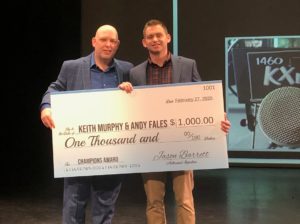
DOING THE RIGHT THING ALWAYS PAY DIVIDENDS
I introduced the Jeff Smulyan and Tony Bruno awards last year because it felt right to honor those who’ve made a significant impact on our industry. This year we added the Mark Chernoff award, and that too felt right to me. Just seeing the pride and joy on each of their faces as they talked about their experiences and earned laughs and cheers from their peers was rewarding. When Dan Mason, Pat McAfee and Mitch Rosen collected this year’s trophies, those positive vibes were once again felt in the theater. I also thought Chris Oliviero’s speech was one of the best 5 minutes of the entire two day event. Very sincere, moving, honest and accurate.
But what personally moved me was a moment that took place on stage between yours truly and Andy Fales from KXnO in Des Moines. Andy and his partner Keith Murphy risked their jobs in January after six of their colleagues were laid off. They expected to be fired but were pleasantly surprised when KXnO management re-hired the six employees, and used the opportunity to expand KXnO on to the FM dial.
Keith and Andy knew they were being presented with the Champions Award for their contributions in saving sports radio in Iowa, but they had no idea that I’d be sending them $1000 dollars to enjoy a fun night out with their teammates. I could’ve just recognized their story without digging into my wallet and most would’ve said ‘that’s pretty cool’, but I wanted folks to understand and appreciate what these guys did for their community, and take notice that BSM cares about the sports radio business.
I’m proud of the work we’ve done to highlight this format. Nobody has spent more more time and energy presenting the sports radio industry in a positive and professional light. From our columns, news stories, podcasts, Top 20 lists, the Summit, and every phone call I take throughout the year, people turn to BSM because they know we love the business and want to help people succeed at it. Ben Franklin once said ‘an investment in knowledge pays the best interest‘, well so too does doing the right thing. It may not always come back in the form of a paycheck, but impacting lives is pretty damn cool. I’ll sleep comfortably knowing the work we’re doing matters, even if it takes a few others a little bit longer to come around.
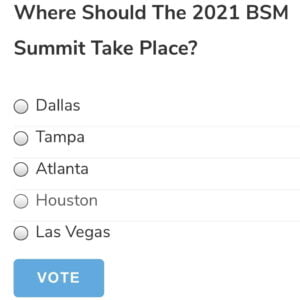
THE LOCATION FOR THE 2021 BSM SUMMIT IS….
We’ve done Chicago, Los Angeles, and New York, and so far so good. My goal for next year is to bring the conference south, and give folks in other cities a chance to experience it. With that in mind, five cities are possible to host our 2021 show. They are Dallas, Houston, Atlanta, Tampa and Las Vegas.
If you could spare a moment to cast your vote it’d be helpful to us. Simply log on to https://bsmsummit.com and let us know where you think next year’s show should be held.
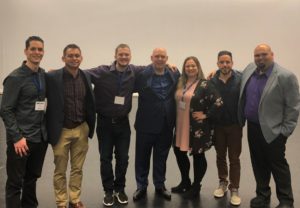
THAT’S A WRAP
I screwed up at the end of the conference and forgot to bring my crew on stage for a final bow. Fortunately, Demetri remembered to acknowledge a few of our team, and that led me to recognize a few others who were part of making this year’s show a success.
Since I blew the final picture opportunity, I’d like to use this space to thank Stephanie Eads, Dylan Barrett, Demetri Ravanos, Tyler McComas, Brian Noe, Brandon Contes, Austin Stellato, Stephen Bolsenbroek, and Michael Matalavage for their help with the 2020 BSM Summit. It takes teamwork to execute a successful conference, and I’m thankful to have had a lot of support from a great group.
It was also very special having my son help out and see his dad in action. Hearing him tell me how proud he was of me, and seeing how the event has since elevated his desire to blaze his own trail in the business has me feeling I’ve succeeded at the one job that matters most – being a dad.
I’d like to close this column by expressing my gratitude to Premiere Radio Networks/FOX Sports Radio, ESPN Radio, Hubbard Radio, Compass Media Networks, Benztown Branding, Skyview Networks, Core Image Studio, Steve Stone Voiceovers, and Harker Bos Group. Their support of the BSM Summit is what makes it possible to produce this show. Any group who supports our business deserves the same in return. I’m more than happy to do my part. I encourage you guys to do the same.
Til next year.
To see some of the video highlights from this year’s Summit, visit our YouTube page by clicking here. You can also see some clips by following us on Twitter.

Jason Barrett is the Founder and CEO of Barrett Media. The company launched in September 2015 and has provided consulting services to America’s top audio and video brands, while simultaneously covering the media industry at BarrettMedia.com, becoming a daily destination for media professionals. Prior to Barrett Media, Jason built and programmed 95.7 The Game in San Francisco, and 101 ESPN in St. Louis. He was also the first sports programmer for SportsTalk 950 in Philadelphia, which later became 97.5 The Fanatic. Barrett also led 590 The Fan KFNS in St. Louis, and ESPN 1340/1390 in Poughkeepsie, NY, and worked on-air and behind the scenes at 101.5 WPDH, WTBQ 1110AM, and WPYX 106.5. He also spent two years at ESPN Radio in Bristol, CT producing ‘The Dan Patrick Show’ and ‘GameNight’. JB can be reached on Twitter @SportsRadioPD or by email at Jason@BarrettMedia.com.



